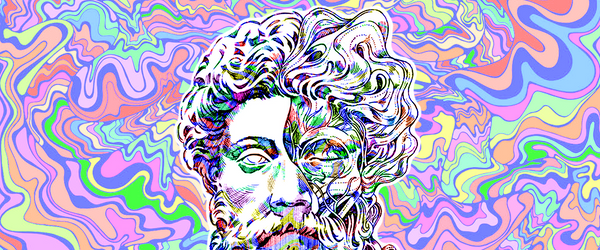Keith Morrison • • 5 min read
Cathedral Consciousness: On Maintaining an Awe-Filled State in Daily Life

I walk off Fifty-first Street and Fifth Avenue into St. Patrick’s Cathedral. I’ve left a very busy city and one of the most economically inspired cities on the planet. I walk into that cathedral, and everything around me speaks of spiritual mysteries. The mystery of the cross, what’s that all about there? The stained glass windows, which bring another atmosphere in. My consciousness has been brought up onto another level altogether, and I am on a different platform. And then I walk out, and I’m back on the level of the street again. Now, can I hold something from the cathedral consciousness? Certain prayers or meditations are designed to hold your consciousness on that level instead of letting it drop down here all the way. And then what you can finally do is to recognize that this is simply a lower level of that higher consciousness… I think that that’s the clue to how to transform your consciousness.
— Joseph Campbell, in conversation with Bill Moyer, The Power of Myth
A Learning Moment
After finishing my final lecture of the semester, I left the university campus and headed into the sweltering streets of Tokyo in hopes of clearing my head a bit before diving into a looming stack of term papers.
Operating largely from the position of ingrained habitual patterns, I unwittingly stumbled through an internalized routine. As I approach a red-lighted cross-walk, I fumbled for my smartphone and earbuds.
Arriving at the corner, I thrust the buds into my ears, then begin absent-mindedly scrolling through podcasts looking for the perfect quantity of information to fill my hour-long stroll. I still had not decided upon which one to listen to as the signal changed to green. I stuck the phone back in my pocket and decided that I will stroll quietly to a small nearby park, sit down, and find a podcast then.
Moments after I cross the street my phone is somehow in my hand again. Facebook. Instagram. Messages. Nothing important. I put the phone away.
I manage to find a seat at the mostly concrete park, despite the large number of local office workers who’ve come here seeking the same respite as myself. I take out my lunch and balance it on my lap with one hand as I scroll through podcasts with the other.
Finally! I find the best option with which to fill the next 45 minutes.
I push play. Buffering…
Buffering…
For some reason my service is lagging and the podcast will not load. I come to the conclusion that the particular episode I am trying to listen to is the issue at hand and I so begin to search for another listening option. I pause in my scrolling for a moment to shovel a spoon full of pickled cabbage into my mouth only to carelessly drop a juicy hunk on my pants. Agitated, I thrust my phone back into my pocket and remove the offending vegetable.
Despite the fact that my chinos are now stained, it is this brute lump of cabbage that evokes a moment’s wakefulness in me.
I look up to see that there are only two people in this cramped public space who are not currently attempting to balance their time between their smartphone or tablet and their lunch.
I take a breath recollecting a passage from Zen Master Dainin Katagiri:
“If we simply see reality as it actually is, then we can see where we are. So just put your body and mind right in the first moment. Then you will see the whole panoramic picture. It’s just like being at the top of a high mountain… Practically speaking, this is the first moment.”
My life-world is speaking to me. I put away the phone—for good this time—then eat my meal with a gaggle of onlooking and hopeful pigeons.
Cultivating the Lesson
The increasing complexity of our world limits our ability to encounter vitality in daily life. We have near constant access to entertainment, which tricks our awe receptors in much the same way diet soda tricks our taste buds: there is an experience that is something like awe but not quite the same.
However, as we consume more and more of these empty awe calories, we learn how to be somewhat satisfied with them. We forget that in each moment, we are participating in a perpetual dialogue with the world around us—one with which to be amazed—instead relying on smartphone apps, disposable music, podcasts, shows, and movies to satisfy us.
I am not about to suggest that we should throw away our televisions or to rail against the acceleration of technology. I am no luddite. Instead, I am claiming that we should set aside some time to cultivate a sensual relationship with our immediate life-world each day and challenge ourselves to remain marginally aware of it with each new hour.
Perhaps the most basic element of Zen Buddhism is seated meditation. Teacher and author of the Shobogenzo, Dogen Zenji, taught that seated meditation is the whole of Zen practice; meditative attention then is of even greater importance than intellectual knowledge or access to sutras. Sitting meditation is one way of settling into our semi-unique life-worlds. Roshi Gudo Nishijima, the late founder of The Tokyo Dogen Sangha, suggested that one begin by sitting each morning and night for 10 minutes at a time. Should one continue to follow this protocol day in and day out for a month, it is thought that the practitioner will be a bit more grounded in his or her daily life, and better able to meet stressful or tedious events with equanimity.
There is yet another step we must consciously take to get the most out of our practice, however, as we have only fulfilled the first half of Campbell’s equation to carry awe out of a sanctified space and into daily life.
The mode of experience cultivated through daily meditative practice gives form to practitioner’s life-world. Dogen Zenji used the image of rowing a boat to explain the process of a human life. The general consciousness of social individuals focuses only on the act of rowing the boat and those events that are related to rowing such as directions, efforts, and goals. Such a consciousness is limited in the sense that it is primarily aware of only the boat, the oars, and their activity. Such an individual mistakes these elements for an actual location and measure of connection with the world around them. They become divided and only relate to the world insofar as it is related to their perceived short-term goals.
One who has cultivated a meditative awareness or managed to carry “cathedral consciousness” back out into the “street-level world” develops an inclusive-yet-shifting perspective of their relational location in the world. Acknowledging oneself as merely an element of the boat-oar system, such an individual is also made aware of the distance between shores, immersion in water, and their willful engagement in the direction and speed of their motion. Their awareness is a locus of perceptual reality; their being, however, extends as far as their capacity to take in the world.
No prayer or mantra is necessary for the development of a broader awareness of one’s life-world. All that is needed is the cultivation of a sense of the perpetual moment in which we reside. Time spent in a sacred space—whether it be St. Patrick’s Cathedral, a yoga studio, or a meditation cushion—broadens one’s perception of awe in relation to the lived world. The instant relief of angst brought about by scanning social media, messaging, or otherwise tuning in to the at-times overwhelming world of techno-connection may blunt our recognition of our participatory enmeshment in the world around us, but it also limits our potential for involved, transformative action in that world.
If we take advantage of moments of pause—either created, or stumbled upon—we may recognize that they are opportunities for enlargement. They are chances to take note of our location in the vital, flowing world of which we are a self-reflective part. As Joseph Campbell stated in The Hero with a Thousand Faces:
“[E]very failure to cope with a life situation must be laid, in the end, to a restriction of consciousness. Wars and temper tantrums are the makeshifts of ignorance; regrets are illuminations come too late…The individual has only to discover his own position with reference to this general human formula and let it then assist him past his restricting walls.”


![Seneca’s Groundless Fears: 11 Stoic Principles for Overcoming Panic [Video]](/content/images/size/w600/wp-content/uploads/2020/04/seneca.png)







